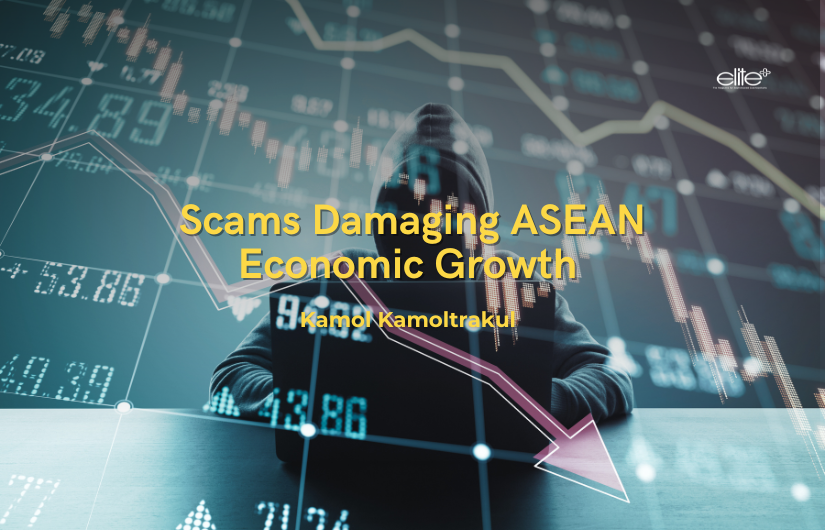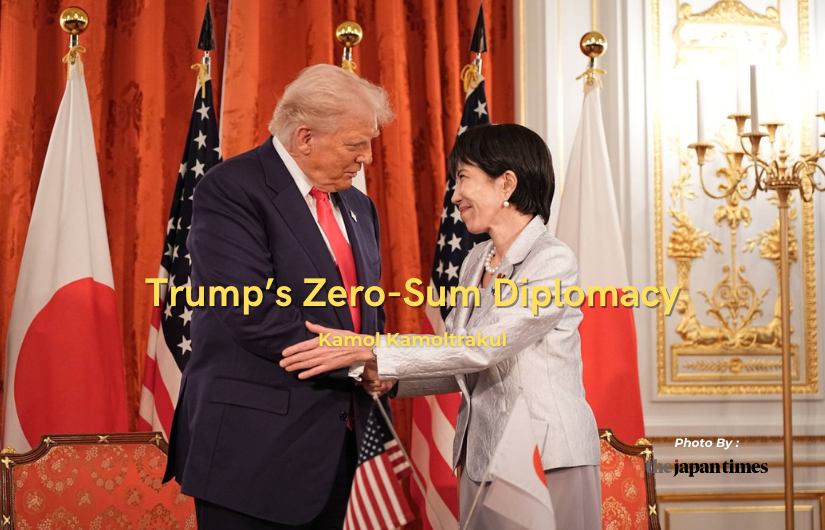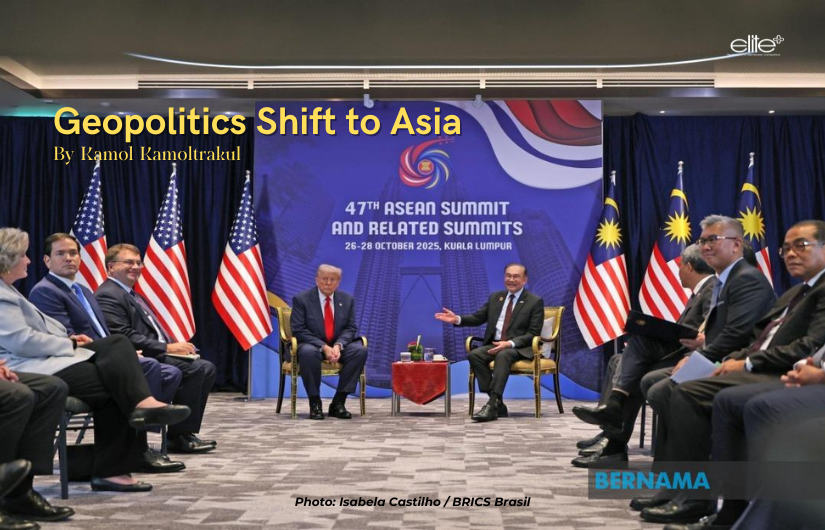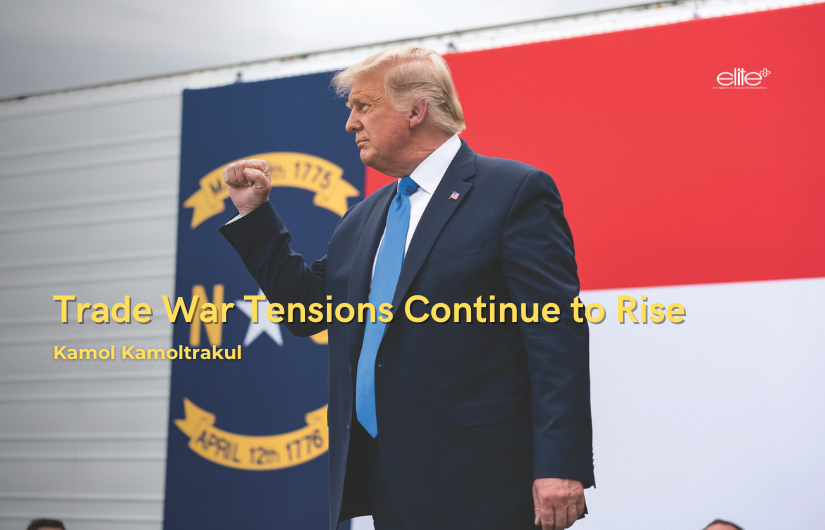Shanghai Cooperation Organisation (SCO) Summit Aims for De-dollarisation
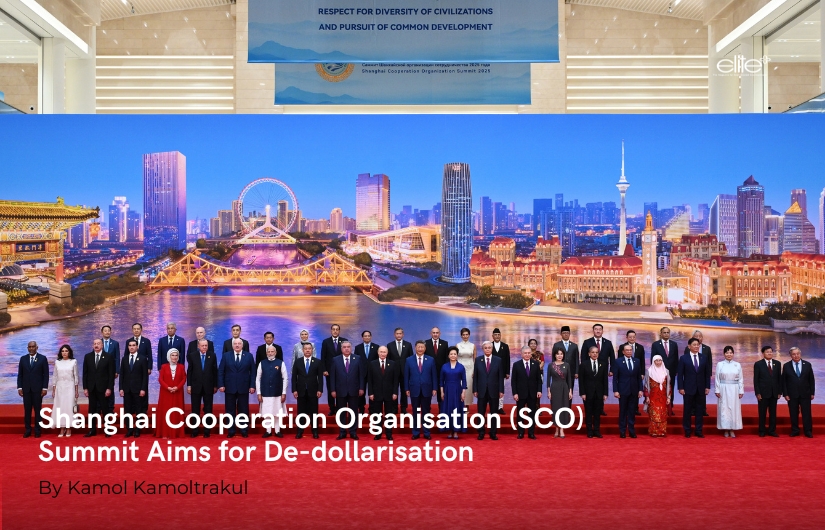
Image by Press Service of the President of the Republic of Azerbaijan (via President.az), licensed under Creative Commons Attribution 4.0 International (CC BY 4.0).
Shanghai Cooperation Organisation (SCO) Summit Aims for De-dollarisation
Kamol Kamoltrakul
The Shanghai Cooperation Organisation (SCO) Summit 2025 in Tianjin, China, which ended on 2 Aug, gave China the opportunity to invite 26 world leaders and distinguished guests to join the 80th anniversary commemoration of the World War II victory over Japan. But, it was really a showcase to demonstrate China’s military might to the world and about where China is headed — right to the top, with Xi playing the role of a global leader.
The SCO member states collectively account for approximately 40% of the global population, with a total population of over 3.2 billion people. The combined GDP of the SCO member states is substantial, representing roughly 25-30% of the world's total economic output. This economic power is driven by major economies, China and India, as well as energy-rich nations, like Russia and Iran. In addition, China, Russia, India, Pakistan, Kazakhstan, Kyrgyzstan, Tajikistan, Uzbekistan and Iran account for about 90% of the world’s population living outside the Western Bloc.
The SCO also covers a vast expanse of Eurasia, encompassing about 60% of the landmass. This includes large portions of Central, South and East Asia, giving it immense strategic importance.
Hence, any move of the SCO would affect both the political and economic environment of world geopolitics, and now it is said that the SCO’s ambition is to de-dollarise the world’s economic system and create a new world order.
One goal of the SCO Summit 2025 was to reiterate the bloc's commitment to de-dollarisation and promote a multipolar economic order that reduces dependence on the US dollar. The US dollar is currently the world’s primary reserve currency, and hence, the most widely used currency for trade and international transactions. However, its hegemony has come into question in recent years due to the geopolitical and geostrategic shifts from a unipolar to multipolar world.
There are several factors that have led to the dollar maintaining its international reserve currency status. One is the so-called "petrodollar" as the vast majority of the world's oil transactions occur in dollars. As the global oil trade accounts for billions of dollars per day and all countries need energy, this creates a great demand for dollars to facilitate these transactions.
However, at the 2024 BRICS Summit, Russian President Vladimir Putin spoke out about the so-called weaponization of the dollar, saying, "The dollar is being used as a weapon… I think that this is a big mistake."
For decades, the world has operated under a "dollar standard". The US dollar has been the world's primary reserve currency since July 1944 by the Bretton Woods Agreement. Central banks hold dollars as their main foreign exchange reserve. Global commodities, like oil, gas and metals, are priced and traded in dollars. Transaction currency, International contracts and loans are often denominated in dollars as well.
Now, though, the aim of de-dollarisation is to reduce reliance on the US dollar in international trade and finance. De-dollarisation is an attempt to move away from this system by using other currencies, like the Euro, Chinese yuan, Russian ruble or Indian Rupee, or assets, like gold, for these purposes.
Hence, the SCO Summit 2025 included advancing alternative payment systems, promoting local currency usage and institutional reforms aimed at insulating member states from Western economic pressure.
Key conclusions and developments regarding de-dollarisation are the establishment of an SCO Development Bank. Leaders agreed to move forward with the establishment of this bank to finance infrastructure and development projects. This institution is intended to compete with Western-dominated financial institutions by facilitating intra-bloc trade and investment in non-dollar currencies.
President Xi Jinping said that the SCO Development Bank will become a key tool for responding to new challenges. “Today, when the world situation is becoming more and more difficult and turbulent, SCO countries and the world need new mechanisms for protection and development.” XI promised loans worth USD 1.4 billion for participating countries in the next three years. Although these funds will not be directly related to the new bank, they emphasise China’s intention to strengthen the economic stability of the region.
It is believed this new bank will unite national payment systems, bypass Western financial structures and strengthen the economic independence of member countries. From this moment, calculations will be carried out directly in local currencies, which significantly reduce the influence of the American dollar.
The SCO development bank will finance megaprojects, from energy networks, roads and railways to industrial complexes and transport hubs and harbours. This decision is considered as a powerful step towards a shift of the world economic centre from west to east.
The other conclusion is to promote local currencies. The Tianjin Declaration supported moving away from the US dollar in bilateral and multilateral trade. This builds on previous initiatives, with Russia reporting that over 92% of its trade with SCO members has been conducted in national currencies since early 2024.
Russia also proposed for an independent payment system within the SCO to bypass the SWIFT network and evade Western sanction risks. The growth of cross-border payment systems and bilateral currency swaps was also highlighted at the summit.
Some analysts have said that the push for de-dollarisation is framed as a core component of fostering a multipolar global economy and resisting unilateral bullying and protectionism. This geopolitical strategy, championed by China and Russia, seeks to create a more balanced and equitable international system.
In addition, the summit announced new cooperation platforms focusing on energy, green industries and digital economy, all of which will leverage alternative financial mechanisms to strengthen regional economic integration. The SCO Development Strategy until 2035 was also adopted, outlining a long-term roadmap for reducing reliance on US-centric trade systems.
Moreover, the SCO Tianjin Summit unanimously agreed to continue expanding intra-regional trade and investment as well as promote trade in services such as creative economies, strengthen exchanges and cooperation in e-commerce and comprehensively deepen practical cooperation across various fields.
Meanwhile, Philip Alberstat, managing director at DBD Investment Bank, said, there are still logistical reasons why the dollar will maintain its global reserve currency status for the foreseeable future. He says it will take decades, not years, for the global economy to transition away from the dollar.
Alberstat concluded, “The institutional relationships and clearing mechanisms supporting the current system represent generations of development. Even if viable alternatives exist – which they currently do not – displacing an established reserve currency requires sustained effort over extended periods.”
Another expert, Lucas Kiely, CEO at Future Digital Capital Management, said that global de-dollarisation is simply unfeasible at this point. A complete global shift from the USD seems improbable in the near future, despite efforts by China and Russia – two countries known for manipulating their own currencies – to destabilise world economics.
Ultimately, de-dollarisation is not necessarily a doomsday scenario, but it is measurably reshaping global reserve management and investor psychology. The clearest winner so far is gold, with its dual identity as a commodity and a quasi-currency that makes it a natural hedge against a fragmenting monetary order.

Kamol Kamoltrakul 48 Posts
Visiting lecturer: Navy Academy Institution, NIDA, School of Governor, Ministry of Interior, Chulalongkorn University, Former Lecturer, ABAC Honorary Advisor Trade and Industry Committee Senate. Senior advisor, Standing Committee on Finance and Banking, The House of Representative. Former Advisor to the Minister of Interior Board Member of ThaiPBS Board Member Of Thai Consumer Council Columnist : Prachachart Business Weekly, Matichon Weekly, Khom Chad Luke Daily Former Program Director Asian Forum for Human Rights and Development ( FORUM-ASIA).




